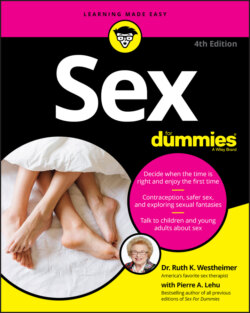Читать книгу Sex For Dummies - Pierre Lehu A., Dr. Ruth K. Westheimer - Страница 72
PMS
ОглавлениеI suppose that I can’t address the topic of menstruation without also addressing premenstrual syndrome (PMS). Does the onset of menstruation affect women in various physical and psychological ways? Yes. The most recent statistic shows that three out of four women have some sort of PMS symptoms. The medical profession has associated many symptoms with PMS, including irritation, depression, changes in appetite, abdominal bloating, breast tenderness, poor concentration, insomnia, crying spells, and swelling of the extremities.
PMS may occur anytime during a 14-day period after ovulation and before the menstrual period begins. Some women have only a few symptoms; many may only have symptoms irregularly.
Of women who suffer from PMS, 3 to 9 percent have symptoms so severe they can’t keep up with the activities of daily living — they seem to have a “supercharged PMS” every month. This condition is real and called premenstrual dysphoric disorder (PMDD). These women often need medical intervention, and I recommend they seek help from their physician and not “just try to deal with it.”
No scientific evidence supports any one cause of PMS/PMDD, although the possible suspected causes include a hormonal imbalance and interaction with brain chemistry, fluid balance abnormalities, and nutritional imbalances. Treatments range from dietary changes and eliminating caffeine to taking medications such as antidepressants and anti-anxiety medications.
While PMS does affect some women severely, I would hate for anyone, male or female, to hold women back by labeling us as unstable in any way. Anyone of either sex can have a disability, which may or may not hold them back, but PMS should never be used as an excuse to hold back women as an entire gender.
